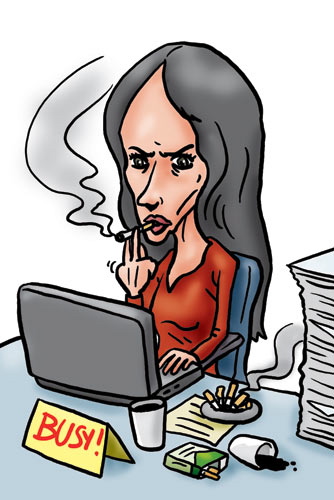Remembering to be Human
This week I had lunch with a KM colleague in Kuala Lumpur. She’s an experienced knowledge manager who’s been recruited to start up a “green field” KM initiative in a well-established (very large) resort. She lives on site most of the time. As you can imagine, there’s lots of awareness building to be done. People have been around for ever, and it’s easy for old timers to turn to the fresh newcomer and say “When you’ve been here long enough, you’ll understand what works and what doesn’t work” - or “we’ve been doing fine for the past thirty years without KM, what makes you think we need it now?”.
During Chinese New Year they are always short staffed (lots of people take long leave to travel home to see their families) and so this year, her first Chinese New Year, my colleague volunteered to help out in the front line operations, helping check in guests and so on. Her colleagues were amazed - she’s an Assistant Vice President, and senior managers of that rank just don’t get their hands THAT dirty. But as she said, since then “when I go and ask the people in that division to help me in a KM-related task, the reception I get is completely different now. They say things like, ‘oh, since it’s you, maybe we should consider how we can help. Before that, they might just not pay any attention.’ “
My colleague wasn’t doing KM last Chinese New Year. She was just helping out. She was being human. It’s remarkable how powerful being human can be in KM, because our efforts spread into so many different places and situations in our organisations. Help counts, and so does good will.
Let me give another example. I’m giving a talk for the actKM Forum in Canberra next week on “Why It’s Hard to be Virtuous in KM” and I’m planning to use some archetypes that come directly out of people engaged in KM projects in several organisations we’ve worked with. While preparing, two archetypes sprang out at me as a striking justaposition: the first is Vivacious Victoria, a knowledge manager archetype who is bright, a great communicator, extremely capable, and somehow manages to keep all the necessary multitasking and parallel activities that are necessary for a successful KM initiative, in play.

The second is Betty Blue, who’s a chain smoking, over-stressed, somewhat defensive and depressive character, struggling to keep her head above the water. What struck me is that sometimes, over the lifetime of a KM effort, the energy and enthusiasm of the Vivacious Victoria quite simply gets burned out. Vicky can become Betty. (BTW, the gender is irrelevant, an accident of the groups that produced the characters, the same thing happens to male knowledge managers too).

So being human in KM is not just about looking after others, but also looking after yourself. It’s terribly important to pace ourselves – the patience and consistency we need as knowledge managers for the long term, needs to be sustained. Things don’t happen quickly. It takes a really long time for people to warm up to us (which is why my Malaysian colleague’s helpfulness is a pretty good strategy to think about). We’re almost always lower on people’s priority lists than the immediate task at their hand. We’re always asking people to do things they don’t see the point of. It’s hard, hard work. So we need to pace ourselves, and have a way of being able to step back, take a deep breath, and recharge.
There’s a third very human quality I’ve observed, and it’s really, really effective. It’s the capacity to be relaxed. I’m the kind of person (being Celtic) who bristles easily if I feel I’m being bullied, or unreasonably resisted. So I push back. And then they push back. So an aggressive, escalating cycle starts, and both parties (or more) spend a lot of time and energy just negotiating the politics and personalities involved, the real work lying on one side.
I have learned (too slowly) that what seems to me at the time to be an unreasonable push back, is very frequently just an expression of uncertainty from the other party, and a more relaxed response like “how do you think we should approach this then?” can instantly turn what feels like impending conflict into collaboration. Having a relaxed, friendly demeanour, and the capacity to be consistently relaxed with all parties, even the most vexing, goes a really long way to making things work and minimising the stress. Note: this is NOT the same thing as relaxing. Being relaxed is often hard work!
So if there are any secret ingredients to long term success in KM, apart from the technical competencies and skills and attitudes you need, these are the very human capacities that they won’t teach you about in the KM cases and courses, but which can keep you fresh, effective and healthy!
- Be Helpful
- Pace Yourself
- Be Relaxed
2 Comments so far
- Naguib
Nice post Patrick!
I do believe that KMers should try to reach out to the community.At one incident, all our e-communication efforts had been failed to inspire people to access to our KM system. Then some of us decided to see and talk to them (people from a certain dept) personally and when we did so, many issues came out and we managed to get their buy-in.
Page 1 of 1 pages
Comment Guidelines: Basic XHTML is allowed (<strong>, <em>, <a>) Line breaks and paragraphs are automatically generated. URLs are automatically converted into links.

Interesting ideas Patrick (and the artwork is awesome.. kudos to the artist!)
When I read this, I was IMMEDIATELY struck by the applicability and archetypes are to “knowledge workers” and personal knowledge management.
Mmmmm.. you’ve got me thinking about connecting knowledge workers / knowledge workers / corporate culture - the archetypal people side - and exploring “how we want to work, and how we want to be” as a precursor to creating a content management and collaboration technology strategy.... mmmm… .
Posted on August 10, 2007 at 08:35 PM | Comment permalink